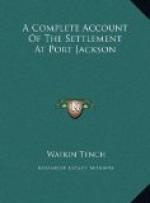December 3rd, 1791. Began my survey of the cultivated land belonging to the public. The harvest has commenced. They are reaping both wheat and barley. The field between the barrack and the governor’s house contains wheat and maize, both very bad, but the former particularly so. In passing through the main street I was pleased to observe the gardens of the convicts look better than I had expected to find them. The vegetables in general are but mean, but the stalks of maize, with which they are interspersed, appear green and flourishing. The semicircular hill, which sweeps from the overseer of the cattle’s house to the governor’s house, is planted with maize, which, I am told, is the best here. It certainly looks in most parts very good—stout thick stalks with large spreading leaves—but I am surprised to find it so backward. It is at least a month later than that in the gardens at Sydney. Behind the maize is a field of wheat, which looks tolerably for this part of the world. It will, I reckon, yield about twelve bushels an acre. Continued my walk and looked at a little patch of wheat in the governor’s garden, which was sown in drills, the ground being first mixed with a clay which its discoverers pretended was marle. Whatever it be, this experiment bespeaks not much in favour of its enriching qualities; for the corn looks miserably, and is far exceeded by some neighbouring spots on which no such advantage has been bestowed. Went round the crescent at the bottom of the garden, which certainly in beauty of form and situation is unrivalled in New South Wales. Here are eight thousand vines planted, all of which in another season are expected to bear grapes. Besides the vines are several small fruit trees, which were brought in the Gorgon from the Cape, and look lively; on one of them are half a dozen apples as big as nutmegs. Although the soil of the crescent be poor, its aspect and circular figure, so advantageous for receiving and retaining the rays of the sun, eminently fit it for a vineyard. Passed the rivulet and looked at the corn land on its northern side. On the western side of Clarke’s* house the wheat and maize are bad, but on the eastern side is a field supposed to be the best in the colony. I thought it of good height, and the ears well filled, but it is far from thick.
[Dod, who is mentioned in my former journal of this place, had died some months ago. And Mr. Clarke, who was put in his room, is one of the superintendants, sent out by government, on a salary of forty pounds per annum. He was bred to husbandry, under his father at Lewes in Sussex; and is, I conceive, competent to his office of principal conductor of the agriculture of Rose Hill.]




